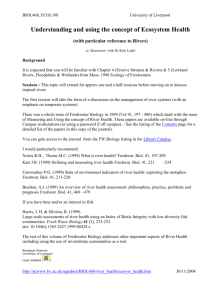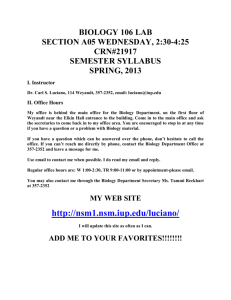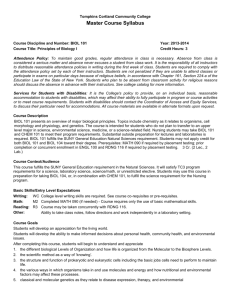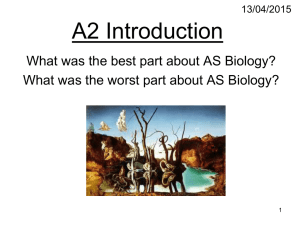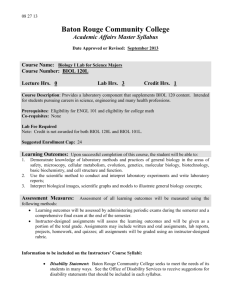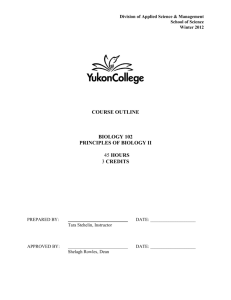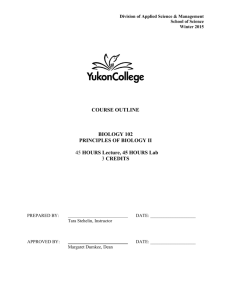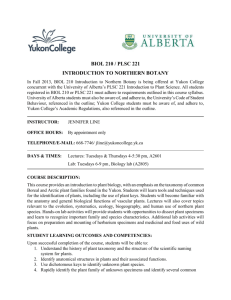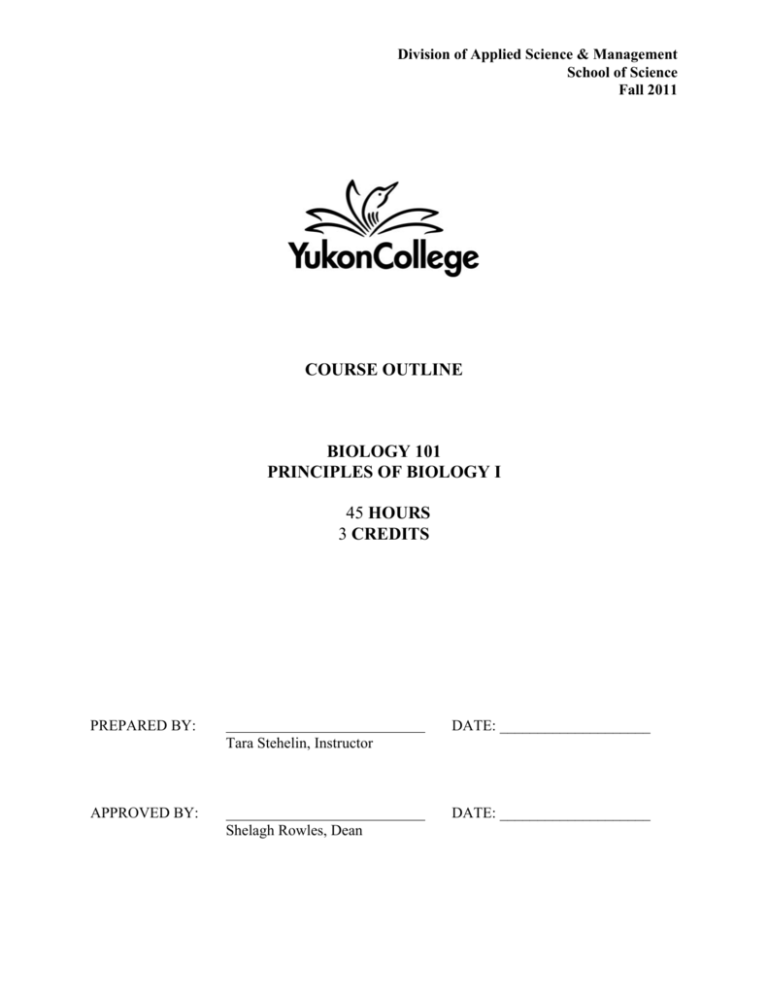
Division of Applied Science & Management
School of Science
Fall 2011
COURSE OUTLINE
BIOLOGY 101
PRINCIPLES OF BIOLOGY I
45 HOURS
3 CREDITS
PREPARED BY:
DATE: ____________________
Tara Stehelin, Instructor
DATE: ____________________
APPROVED BY:
Shelagh Rowles, Dean
YUKON COLLEGE
Copyright September, 2011
All rights reserved. No part of this material covered by this copyright may be reproduced or
utilized in any form or by any means, electronic or mechanical, traded, or rented or resold,
without written permission from Yukon College.
Course Outline prepared by Tara Stehelin, September 6, 2011.
Yukon College
P.O. Box 2799
Whitehorse, YT
Y1A 5K4
School of Science
BIOL 101
Credit Course
Fall 2011
PRINCIPLES OF BIOLOGY I
INSTRUCTOR: Tara Stehelin, B. Sc., M. Sc.
OFFICE HOURS: FRIDAY 11:00 – 12:30, or by appointment
OFFICE LOCATION: A2806 (behind biology lab)
TELEPHONE: : 668-8898
E-MAIL: tstehelin@yukoncollege.yk.ca
FAX:
COURSE OFFERING
DAYS & TIMES:
LECTURES
Tuesdays and Thursdays 1:00 – 2:30
Room:
A2103
LABS:
Room:
Wednesdays OR Fridays 1:00 – 4:00
A2805 (Biology Lab)
COURSE DESCRIPTION
This course is core introductory science course, transferrable to most Canadian universities as a
first-year level Biology course, emphasizing principles with wide applications to all living
organisms, including cell structure and function, mechanisms of inheritance, evolution and
adaptations to the environment. A comparative approach to the unity and diversity of organisms
is stressed. Mandatory lab sessions reinforce subject matter presented in lectures.
LEARNING OUTCOMES:
Upon successful completion of the course, students will be able to demonstrate understanding of
scientific principles, such as the scientific process used to acquire new knowledge, the
mechanism by which genetic traits are inherited, and of the scope of diversity of life. Students
will also be able to demonstrate knowledge of cell structure and functioning, basic steps in
metabolism, cellular respiration, and photosynthesis. Upon completion of mandatory lab
sessions students will be able to demonstrate knowledge of basic ecological practices such as
population density estimations, basic statistics, correct procedures of microscopy, taxonomy of
general groups, and an understanding of the functioning and terminology used in organ systems
and organ function.
COURSE TRANSFER:
UBC With BIOL 102, Biol 101 1st yr (6)
SFU
BiSc 101 (3)
UVIC BIOL 100L (1.5) or with BIOL 102,
UAF
Biol 105x (3)
= Biol 190 A&B (3)
UR
With BIOL 102, Biol 100/101 (6)
UAS With BIOL 102, Biol 113 (3)
UNBC Biol 100L (3) Yukon College Biology 101 & 102 = UNBC Biol 100 (4) & Biol (2) 100L
For more information about transferability contact the School of Science office.
COURSE PREREQUISITES
Admission to the Division of Applied Science & Management.
DELIVERY METHODS/FORMAT:
Material will be presented in two lectures and one lab session per week. Attendance in the
laboratory is mandatory. Students must pass the lab and lecture portions independently.
COURSE REQUIREMENTS/EVALUATION:
Attendance and Participation
Students must attend the laboratory session assigned to them upon registration, once per week.
A portion of the lab mark (10%) will be awarded for attendance and participation in exercises.
Assignments
Assignments are given during laboratory sessions. Most students finish assignments during the
lab session, although they are not due until the next week day.
Projects
None.
Tests
Quizzes on lecture material are given once every two weeks. There are 5 quizzes in total, worth
10% each and then a final exam worth 15% of the total mark. The final examination will be held at
the end of the term. It will cover the entire course and the examination date will be announced as soon
as confirmed by administration. Quizzes on laboratory material are given every lab session (except
the first lab) and cover material from the lab exercises the week before. There is no final lab exam.
Evaluation
On lecture material: five quizzes worth 10% each (50%), and a final exam worth 15% for a total
of 65% of the mark for lecture portion of the course. Laboratory marks make up 35% of total
mark. Laboratory assignments worth 15.75%, laboratory quizzes worth 15.75%, and attendance
and attitude in the lab worth 3.5% of total mark. There is no final exam for the laboratory portion
of the course.
Plagiarism
Plagiarism involves representing the words of someone else as your own, without citing the
source from which the material is taken. If the words of others are directly quoted or
paraphrased, they must be documented according to standard procedures (APA). The
resubmission of a paper for which you have previously received credit is considered a form of
plagiarism.
Plagiarism is academic dishonesty, a serious academic offence, and will result in you receiving a
mark of zero (F) on the assignment or the course. In certain cases, it can also result in dismissal
from the college. And do not underestimate the impact such a situation will have on your
reputation.
STUDENTS WITH DISABILITIES OR CHRONIC CONDITIONS:
Reasonable accommodations are available for students with a documented disability or
chronic condition. It is the student’s responsibility to seek these accommodations. If a
student has a disability or chronic condition and may need accommodation to fully
participate in this class, he/she should contact the Learning Assistance Centre (LAC) at
(867) 668-8785 or lassist@yukoncollege.yk.ca.
REQUIRED TEXTBOOKS/MATERIALS:
“Biology, Concepts and Connections”, Campbell, Mitchell & Reece. 2012 7th Ed., Addison Wesley
Longman Press
Or
“Campbell Biology” 7th, 8th, or 9th Edition, Reece, Urry, Cain, Wasserman, Minorsky, and Jackson.
Pearson Benjamin Cummings
Lab Manual: assembled by instructor and handed out during first lab session
TOPIC OUTLINE/SYLLABUS
WEEK
TOPIC
1
Introduction to Biology:
- Overview and introduction to biological science
-scientific method
Ecology:
-Diversity of life in the biosphere
-Population Ecology
-Community Ecology
Evolution and Speciation:
- Evidence of evolution, history, classification,
-Natural selection
-speciation
Diversity:
- the kingdoms of life
-taxonomy
-Prokaryotes
-Protists
-Fungi
-Plants
-Invertebrates
-Vertebrates
Cell Theory, Metabolism
- basic chemistry of life
-enzymes
- membrane function
- organelles
- energy flow
2
3
4, 5,6
9,10
11,12
Respiration & Photosynthesis
- glycolysis
- aerobic respiration
- glucose production
13
Review



